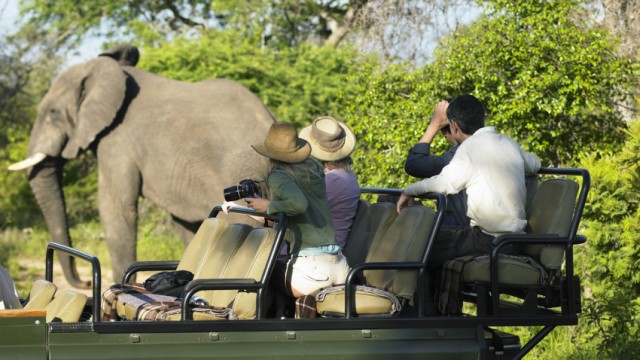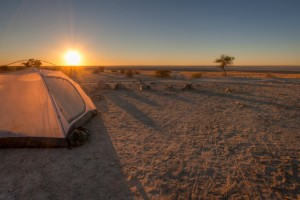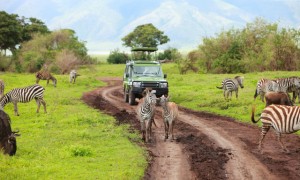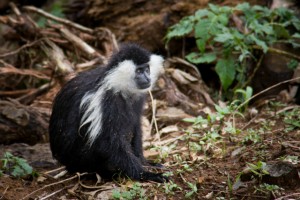It’s the quintessential African experience, and no trip to the continent would be complete without one. But going on safari can sometimes seem like an unaffordable endeavor. The full-on experience can include white table-clothed lunches in the bush, luxury tented camps complete with gourmet cuisine and spa treatments, personal rangers accompanying you in your private 4×4, hot air balloon rides as the sun rises, and refreshing cocktails under an acacia tree as it sets.
But safaris don’t need to be out of reach for the average traveller. Sure, a safari on a budget will trim off many of the frills, but when it comes down to it, are you in the great African outdoors for a manicure and a martini — or for a life-affirming animal encounter? If it’s the latter, here are a few tips on how to plan a dream safari trip when your budget’s not unlimited.
Stock up on discount cards
Whether it’s country-specific, such as South Africa’s Wild Card, or something more global like an internationally recognized student card such as ISIC, looking into ways to cut the cost of the daily entrance fee is an excellent way to save. In East Africa’s often-pricey parks, student cards can slash ticket prices in half. TIP: remember that the fees across the continent tend not to be one-off entry costs, but tariffs that you pay for each 24 hours spent in the park, making this one of the major costs of any wildlife watching trip.
Buy a tent
Camping is the single biggest way to cut costs when you’re on safari. If you’re happy to sleep under canvas or nylon, you’re looking at accommodation rates that are a tiny fraction of those demanded by the luxury lodges. And even the most ardent tent-haters can’t deny that there is something utterly magical about sharing the animals’ sleeping space, for safaris aren’t just about looking at animals — they’re about hearing and smelling them too. Many parks offer unfenced camps, so make sure you invest in a powerful torch — you don’t want your first Big Five encounter to occur when you’re taking a midnight toilet trip!
If camping is really not your thing, look out for the simple but affordable cabins offered in some national parks, particularly those in South Africa. These often have shared bathroom and kitchen facilities, but you don’t have to travel with a tent. While you’re shopping, consider buying a cooler (chilly bin/esky), so your passengers can partake in the wonderful African ritual known as the sundowner. A cold beer, glass of wine or cocktail of your choice sipped as you gaze over a waterhole at dusk will go a long way towards making you feel like you’re truly on safari. TIP: Make sure you check the park’s rules on alcohol before you partake.
Do-it-yourself/Self-drive
Do your homework before you set off and find out which parks offer the opportunity to view the wildlife from your own vehicle. When you cut out the cost of a guided drive, you’re looking at a vast saving. Most important is to find out whether a 4×4 is recommended or required. Many parks in South Africa have paved or sealed roads, making 4WD hire an unnecessary expense. Elsewhere though, you can’t hope to traverse some reserves in a normal sedan car and might even be turned away at the park gate if you’re not behind the wheel of an appropriate vehicle.
Invest in a book
If you’re in a park that allows self-drive safaris, buying a comprehensive and easy-to-use field guide to the area is essential. A pictorial guide to your chosen park or region lessens the need for a knowledgeable guide, saving cash while still ensuring that you get all the info on the species you’re spotting. Spending some time before the trip reading up on the animals you’re particularly eager to see will also enhance the experience, since you’ll have a better idea of when and where to seek them out.
Consider the smaller species…
Everyone wants to see big cats on a hunt, spot giraffes munching in the trees or check all of the Big Five (elephant, lion, rhino, buffalo and leopard) off their checklist, but parks featuring big game are generally more expensive to enter. If you’re travelling on a serious budget and are just as happy seeing smaller species in their natural habitat, you can vastly cut down the daily conservation fees. Zanzibar’s Jozami Forest is home to Colobus monkeys and its entrance fees are up to 10 times cheaper than some of the big game parks on the mainland. Over in Kenya, South Island National Park boasts only crocodiles, snakes and birdlife, but entry is a quarter of the cost of the Masai Mara and reaching this petite park in Lake Turkana is a travel tale in itself.
…And the smaller parks
While it’s wonderful to drop names like Serengeti, Masai Mara or Kruger in your latest Facebook status updates, visiting these high-profile parks is not the best way to save a few bucks. Consider smaller parks in lesser-visited lands: The Gambia’s Abuko Nature Reserve packs in an amazing array of species and entrance costs less than US$5 per person, for example; and while Ghana’s Mole National Park might not be as famous as its east African counterparts, it offers utterly unrivalled value, with entrance fees under US$5 and guided walks or drives to see its elephants, buffaloes and antelope for a similarly modest price. Even in countries renowned for their safari experiences, smaller parks offer great value — the entry fee at South Africa’s Mokala National Park, for example, is less than half that of Kruger, though it still boasts rhino, buffalo and giraffe among its many species.
Go public
To save when you’re on safari, you have to avoid the private lodges, no matter how enticing their mid-drive G&Ts might be. Stick to national parks, and where possible, opt only for the government-run camps rather than paying more for a privately-owned lodge.
BYO
Assuming your accommodation has some form of self-catering facilities, it’s best to stock up on everything before you arrive. Park shops tend to be under-stocked and overpriced, so where possible (and permitted) bring your own food, your own booze and if you’re planning on barbequing (again, where allowed), come equipped with your own charcoal and firelighters. It’s a small saving, but the cash you save on avoiding over-inflated prices could end up covering another night of camping in the park.




